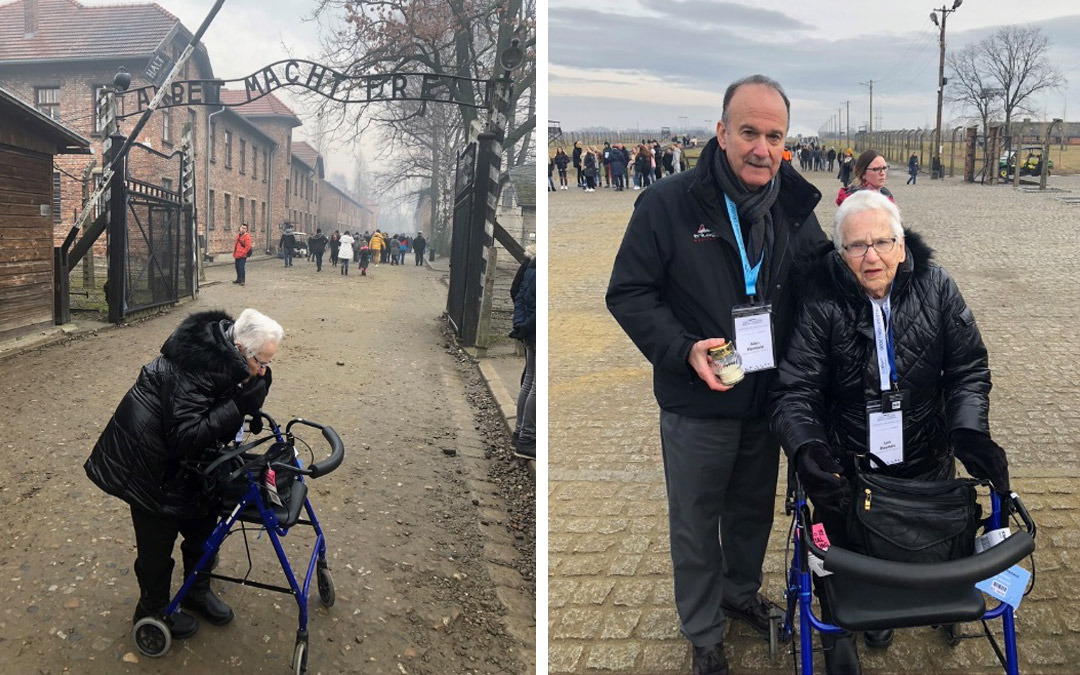Observed Apr. 20-21, Yom HaShoah, or Holocaust Remembrance Day, will look different this year than in the past due to the coronavirus pandemic. The year 2020 marks three-quarters of a century since the liberation of the Auschwitz-Birkenau extermination camp, an anniversary for which Jewish organizations around the world will conduct virtual commemorations.
Last January, more than 100 survivors of Auschwitz returned to southern Poland in remembrance of the liberation. Among them was Monroe Township, N.J., resident Lois Flamholz, 92, accompanied by her son, Allan Flamholz of Lutherville-Timonium.
“This was my first trip there, and the first time my mother had been back since the war,” said Mr. Flamholz, president of Trilogy Machinery Inc. “Visiting the camps where more than 90,000 people were imprisoned and hearing how the Nazis couldn’t keep up with the small gas chamber because their operations were so successful was numbing. You think back and it’s hard to believe what went on there, yet there I was with this group of survivors telling their stories.”
Born in Zdenova in the Carpathian Mountains in what became Hungary in 1939, Mrs. Flamholz spent five weeks in the Munkacs ghetto before being transported in a cattle car to Auschwitz in 1944. At 16, Mrs. Flamholz, whose maiden name was Weiss, arrived with her mother, father, younger sister and two younger brothers.
“When we arrived at the camp, German soldiers separated men and women,” she said. “The soldiers would point for us to go left or right and that is when I was separated from my mother, sister and brothers. The first place we stopped was the bathhouse, where we stood naked as women shaved our heads. From there, they put us into wooden bunks, with no blankets or straw and no room to lay down.”
Mrs. Flamholz also arrived at the camp with four female cousins. “We went through the whole war together, so I wasn’t completely alone,” she said. “When we first arrived at the barracks after they shaved us, we were crying for our mothers. One of the nice Kapos [prison functionaries] told us we would see our mothers on Sunday. But there were some mean ones who said, ‘You see the smoke over there? That’s where your mothers are.’ That’s how we learned about the crematorium.”
Mrs. Flamholz and her cousins remained in work camps until February of 1945. That’s when they were forced to march 30 kilometers daily for six weeks before being liberated by British forces from the Bergen-Belsen concentration camp.
“We were all so hungry, and people started dying after liberation from getting a lot of food,” she said. “I lost a lot of friends at that point. I, too, was very sick, and when liberated I wouldn’t look at the food they gave us. They took me to the hospital with my cousin, and by the time we arrived there I was starting to feel better. But my cousin was very sick. I was trying to give her water and couldn’t understand why she wasn’t separating her teeth. That’s when I realized she was dead.”
Mrs. Flamholz was released from the hospital and learned that her other cousins were being sent to Sweden with the International Red Cross. She lived in Sweden for more than two years, eventually tracking down a pair of uncles who came to the United States during World War I.
“It was by coincidence my mother found her family in New York,” Mr. Flamholz said. “Two of her uncles owned a bar, and the wife of one of their linen vendors was collecting clothes to send to survivors in Sweden. The recipients of the clothes would send thank-you notes back. In my mom’s thank-you note, she mentioned she was looking for her uncles, who turned out to be this vendor’s customer. That’s how they got in contact.”
In 1948, Mrs. Flamholz arrived in New York City, where she attended night school to study English. In her English class, she met her late husband, who escaped a Jewish ghetto and lived as a partisan in the forests.
Together, the couple had three children, five grandchildren and 13 great-grandchildren.
“Hitler destroyed my whole family and tried to kill me, too,” she said. “Now he is dead, and I have a beautiful family I am so proud of. That is what keeps me going. I still miss not having a sister or a brother, but I thank God I have a wonderful family. I live for that.”
Flamholz didn’t always talk about her experiences in the Holocaust, but now she spends much of her time speaking in public and to her grandchildren and great-grandchildren who live in Baltimore. The family has even recorded her life story for future generations.
“My main message to the kids is to treat everyone the way you want to be treated,” she said. “Don’t look at color, nationality or religion. Just see everyone how you want to be treated. Our children are the future leaders and need to make sure what I went through never happens again.”
While returning to Auschwitz in January was not easy for Mrs. Flamholz, she said she undertook the journey to honor the memories of her parents, siblings, aunts, uncles and cousins who perished in the Holocaust.
“I keep the memorial days and say the prayers, but I wanted to go and say Kaddish at the crematorium, the exact spot where my family was killed,” she said. “It wasn’t easy at my age, but I did it and that is the reason I went back.”





